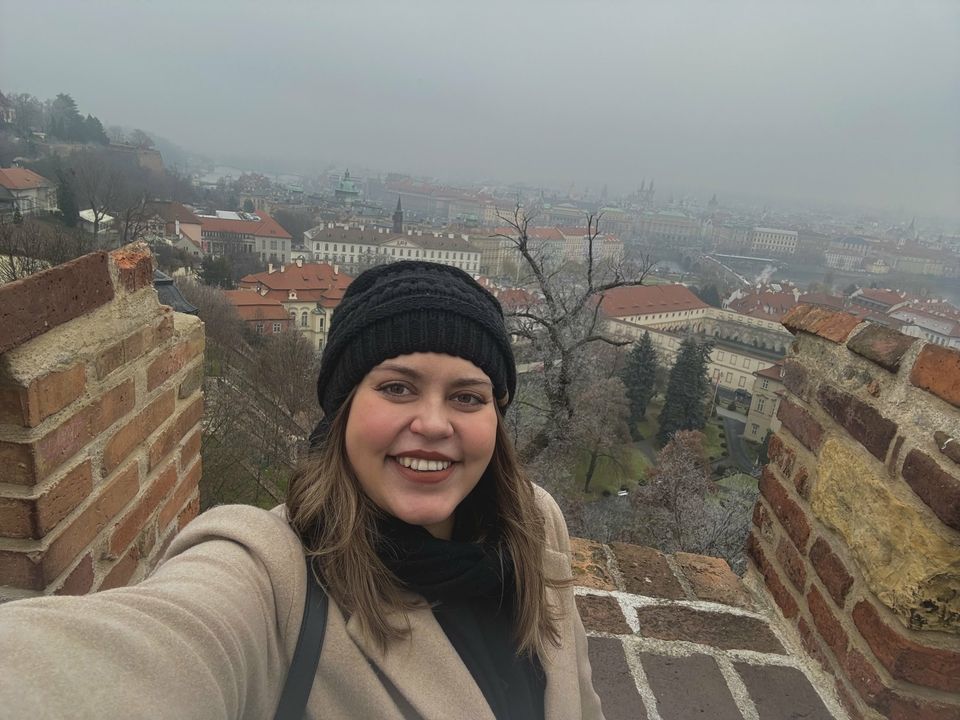Tips for Managing Your Money as an Auxiliar de Conversación
One of the aspects of moving to Madrid I was most worried about was managing my money on the monthly stipend of €1000. But, with about four and a half months of living here under my belt I now feel like I have established a solid routine for my monthly budget. Here I will share my experience and tips for managing your money as an auxiliar de conversación.
Banking
The first step for managing my financial situation in Spain was figuring out my banking situation. As an auxiliar de conversación, you are required to open a Spanish bank account so your school can pay you the monthly stipend. For my experience opening an account with Santander bank–and other logistical tasks after moving–check out my post on my first day in Madrid.
Once I had my Spanish bank account set up, I wanted to figure out how to move money between my Spanish account and the U.S. checking account I already had. This desire was primarily because I planned on continuing to use my U.S. credit card to pay for most things, and my credit card account would not let me add my Spanish bank account as a payment option. I thought PayPal might be an option that would also allow family in the U.S. to send me money if needed. However, I soon found out that PayPal will not let you add bank accounts from different countries to the same account.
I remembered that my orientation leader had mentioned an app called Wise for transferring money, so I looked into it. I found out Wise is specifically designed for transferring money internationally, and in my experience it tends to have a better exchange rate and lower fees than PayPal. I now use Wise to transfer money between my accounts by making a direct wire transfer to Wise from my Spanish bank account. Wise then sends the money to my U.S. bank account without any extra steps.
Paying for things with a Spanish debit card is also an option, but this approach allows me to still earn cash back on my credit card and build my credit history in the U.S. Many stores and restaurants will automatically charge in euros, but if given the option between euros and U.S. dollars, I generally choose euros as my credit card/bank’s exchange rate tends to be better than the one offered. I have found the same to be true for ATM exchange rates.

Budget Model
Once I figured out my banking situation, I focused on setting up a budget. I started with my known monthly expenses, and then set a limit for unknown expenses like groceries and going out. Below is my personal budget model.
Expense | Cost | Total (Sep-Jul) |
Rent | €400 | €4,400 |
Abono Joven metro card | €8/20* | €160 |
Gym | €24.99 | €274.89 |
Phone | €20 | €220 |
Electric (estimate) | €30 | €330 |
Groceries (estimate) | €150 | €1,650 |
Going out/Incidental | €150 | €1,650 |
Total | €782.99/794.99 | €8,684.89 |
*The metro card was €8/month from when I arrived in September to mid-January, when it was scheduled to go up to €20/month.
Now, I will share some important considerations and my thought process while constructing this budget. First, the total column runs from September to July (11 months). I arrived in Spain at the beginning of September and plan on returning to the U.S. sometime in mid-July. However, I did not start working at my school until October 1, and the school year will end on June 20. This means I will only be paid for working October through June. Additionally, auxiliares in Madrid are generally paid their monthly stipend AFTER completing their month of work, meaning I did not receive my first paycheck until the beginning of November. Including only monthly living expenses, and excluding travel expenses for trips I took the first two months, I spent nearly €2,200 total in September and October. I paid these expenses entirely with money already in my U.S. bank account. In summary, plan to have a few thousand dollars in your checking/savings accounts before arriving in Spain because you will not have an income for the first two months or so, and your account balance will be catching up to the previous months from then on.
Next, I constructed my budget keeping in mind that I will be living here for almost 11 months while only being paid for 9 months. In total for those 9 months, I will earn €9,000 from the auxiliar stipend. I am also extremely lucky and grateful to have an extra €500 from my family wishing me well for my time living abroad that I was able to include in my total budget. My goal was to spread my known income out over 11 months instead of 9, resulting in a monthly allowance of €864. I intentionally gave myself lower limits/estimates on groceries and going out to give myself some wiggle room from month to month.

Finally, I keep my monthly living expenses and my travel expenses separate. In my final year of college, I worked as a server in a restaurant. I was lucky enough to be in a situation where I could save most of my earnings, and I did so knowing I would want to travel a lot when I arrived in Spain. So, my personal goal is to try to stay within the auxiliar stipend for my monthly living expenses, and any travel expenses will come from what I already had saved at home. This approach may or may not work for you depending on your personal situation, but it is an example of different considerations you may want to take into account as you plan for your time living abroad.
Staying within this budget is not always easy, but it is definitely doable. My biggest recommendation to help meet your personal financial goals would be to focus on housing and rent first. Rent is likely to be by far your biggest monthly expense, so your housing hunt when you first arrive can set the tone for your financial experience the rest of your time here. I live outside the city center in a suburb called Getafe, which I chose to do in order to be closer to my school and for lower rent. I have three roommates and two bathrooms (one shower). Keep in mind that apartments in the city center may have higher rent, more roommates, and/or less space.
Monthly Tracking
With the budget I set for myself as a guide, each month I track how much I spend. First, I enter known expenses like rent into a spreadsheet. Then, I enter my estimated grocery budget. As I buy groceries throughout the month I enter the amount I spent, but I also keep an entry for how much more I am likely to spend on groceries during the month. I have columns for what the expense is (e.g. rent, groceries), the cost, the store/restaurant, and which account I used to pay (credit card, U.S. checking, Spain checking).
Expense | Cost | Store | Account |
Rent | €400 | Landlord | Spain checking |
Phone plan | €20 | Vodafone | Spain checking |
Metro card | €8 | Tarjeta Transporte Público | Credit card |
Gym | €24.99 | Basic Fit | Spain checking |
Estimated groceries | €166.53 | Various | Credit card |
Estimated electric | €24.61 | Landlord | Spain checking |
Going out/Incidental | €224.86 | Various | Credit card |
Total | €868.99 |
In the table above, the cost for estimated groceries, estimated electric, and going out/incidental are my current averages per month for each category. I am going to primarily blame the month of September for the high average on going out and incidental expenses because I was eating at restaurants for a week during orientation while I was still finding housing, buying small things for my apartment, and not keeping track of my spending yet. I am also going to blame my habit of ordering food when I say I’m only going out for a drink with friends.
In addition to individual expenses, I also track how much of my monthly allowance I have remaining, the total cost of my groceries, the total cost of my going out and incidental expenses, and how much of my overall stipend income of €9,500 is remaining.
Seriously though, going out and incidental expenses like clothes and decorations for my room are definitely where I could cut some spending. But, I am also trying to enjoy my experience here and avoid limiting myself to the point where I miss out on spending time with friends and exposing myself to new things. My current monthly spending average is only about €5 over my monthly allowance of €864. By no means did I think I would be able to have a net gain in my checking account by the time I leave, so I am currently well within my goal of not losing too much money.
Final Thoughts
- Groceries here are WAY less expensive than in the U.S. (as is the cost of living in Spain in general). I feel like I am probably on the higher end for the total amount spent on groceries because I enjoy cooking and am fairly active. By which I mean I walk everywhere, lift weights three times a week, and am currently training for a marathon. Naturally, I need a lot of food to keep me going.
- This approach works for me because I was already in a solid financial situation before I moved to Spain. Some of the tips I’ve listed here may or may not work for you. Regardless, I would still highly recommend keeping track of your spending in a way that works for you. Sometimes you don’t realize how much you’re spending until you see it all laid out.
- I am able to keep my travel budget separate from my monthly budget because I planned ahead for it and had money already saved. If you want to use your stipend income to travel, be intentional about balancing those costs with your other living expenses.
- You likely will only get to live in Spain for a year or two (unless you end up deciding to move here permanently, which I have promised my parents I won’t do). As such, I personally tend to err on the side of saying yes rather than no to anything that could be a new memory or experience.
I hope these tips are helpful for budgeting and managing your money as an auxiliar de conversación in Spain. For more ideas, I personally drew inspiration for my own budget from these previous posts by other auxiliares.
Related Posts
Who is Rollguine? All about Me!
Hello and welcome! My name is Rollguine (pronounced Ruh-Jean), but you can call me Morgan. I’m from Lexington, Kentucky. I graduated from Bryan Station High School in 2016 and went... keep reading
Stopped Waiting and Started Exploring the World - Alone
Why travel solo? One traveler shares how a life-changing solo trip after graduation sparked deep self-discovery, freedom, and meaningful connection. Discover why going alone might be the best decision you'll ever make.
Lessons from My First Marathon in Madrid
Running a marathon isn't something I ever thought I'd do. I've never really enjoyed running, and I don't feel like I've ever been particularly good at it. But, I'm always... keep reading


